|
|
|
Sort Order |
|
|
|
Items / Page
|
|
|
|
|
|
|
| Srl | Item |
| 1 |
ID:
140223
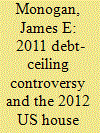

|
|
|
|
|
| Summary/Abstract |
This article considers how a key legislative vote—that is, the August 2011 vote to raise the federal debt ceiling—influenced the 2012 elections for the US House of Representatives. Two outcomes are analyzed: (1) the incumbents’ ability to retain their seats through the 2012 general election, and (2) their share of the two-party vote for members who faced a general-election competitor. In developing this study, the research design was registered and released publicly before the votes were counted in 2012. Therefore, this article also illustrates how study preregistration can work in practice for political science. The findings show that seat retention did not vary with the treatment; however, incumbents who voted against raising the debt ceiling earned an additional 2.4 percentage points of the two-party vote.
|
|
|
|
|
|
|
|
|
|
|
|
|
|
|
|
| 2 |
ID:
099270
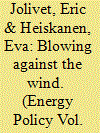

|
|
|
|
|
| Publication |
2010.
|
| Summary/Abstract |
This paper analyses the deployment of wind power and the related local controversies using actor-network theory (ANT). ANT provides conceptual instruments for a fine-tuned analysis of the contingencies that condition a project's success or failure by focusing on the micro-decisions that intertwine the material aspects of the technology, the site where it is implemented, the participation process, and the social relations in which they are embedded. By considering controversies as alternative efforts of competing networks of actors to 'frame' the reality and enroll others, ANT sheds light on the complex and political nature of planning a wind farm project, insofar as it consist in aligning material and human behaviours into a predictable scenario. 'Overflows' occur when actors do not conform to expectations, adopt conflicting positions and develop their own interpretations of the project, thus obliging designers to adapt their frames and change their plans. To demonstrate this framework, we apply it to the case of a wind farm project in the South of France, near Albi. Our analysis suggests a new approach to examining wind power projects in terms of the interaction between globally circulating technologies, unique characteristics of the site, the participation process and the social dynamics that emerge when these are combined.
|
|
|
|
|
|
|
|
|
|
|
|
|
|
|
|
| 3 |
ID:
162759


|
|
|
|
|
| Summary/Abstract |
The “big tent” mission of the Journal of Global Security Studies is well illustrated by this issue, as our first four articles explore issues from ontological security to cyber secrecy to sexual torture to traditional analyses of compellent threats. The next three articles illustrate the value of conversation between different parts of the field in their juxtaposition of arms control, humanitarianism, and empire; security governance and domestic politics; and reflexivity about casual claims in the study of ethnic conflict. Our final article, a research innovation, issues a critique of a well-respected network dataset.
|
|
|
|
|
|
|
|
|
|
|
|
|
|
|
|
| 4 |
ID:
124274
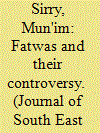

|
|
|
|
|
| Publication |
2013.
|
| Summary/Abstract |
This article discusses a different side of two controversial fatwas - one against Muslims participating in Christmas celebrations and the other against pluralism, liberalism and secularism - issued by the Majelis Ulama Indonesia (MUI, Council of Indonesian Ulama). Most studies on MUI have emphasised the role that the Council's fatwas have played in inciting sectarian violence in Indonesia. Without denying the connections between violence and the MUI fatwas, this article argues that these controversial fatwas have also opened up room for more fruitful and constructive discussions among different religious groups in Indonesia. This article asks: What were the roots of the controversy over these intolerant fatwas? How did the state respond to them? And what does the controversy over these fatwas tell us about the nature of public debate on Islam in Indonesia? By answering these questions this article will shed light on aspects of contemporary Indonesian public debates about Islam that have been overlooked in current scholarship
|
|
|
|
|
|
|
|
|
|
|
|
|
|
|
|
| 5 |
ID:
122843
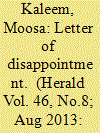

|
|
|
| 6 |
ID:
131434
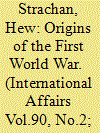

|
|
|
|
|
| Publication |
2014.
|
| Summary/Abstract |
The recent crop of books on the origins of the First World War dispenses with the notion of inevitability in the outbreak of war, and stresses the maturity of European civilization in 1914. They are in danger of prioritizing urban life over rural, civilization and culture over backwardness and superstition. They also say less than they might about the enduring place of war in international relations. The stress on contingency is to be welcomed for getting history away from the determinism of long-term trends, and for reopening the uncertainty of the outcomes still open to the Great Powers in 1914. However, the overall effect is cyclical. The prevailing wisdom on the reasons for war has reverted to the argument that 'Europe slithered over the brink', which dominated from the 1930s until the publications of Fritz Fischer in the 1960s. This does not mean that 'Fischerism', with its belief in German war guilt, is extinct. The challenge which now confronts historians, as they approach a four-year centenary, is to break this circularity and to explore new paths.
|
|
|
|
|
|
|
|
|
|
|
|
|
|
|
|
| 7 |
ID:
155703


|
|
|
|
|
| Summary/Abstract |
Japan’s use and storage of chemical weapons in the Second World War is a relatively unknown aspect of the conflict. Jeanne Guillemin explores the legacy of this issue and reflects on Beijing and Tokyo’s joint efforts to manage the abandoned weapons still present in China.
|
|
|
|
|
|
|
|
|
|
|
|
|
|
|
|
| 8 |
ID:
130701
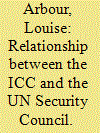

|
|
|
|
|
| Publication |
2014.
|
| Summary/Abstract |
THE POWER OF THE UNITED NATIONS SECURITY COUNCIL TO REFER COUNTRY situations to the International Criminal Court (ICC) has been hailed, particularly among international human rights activists, as a chance to expand the reach of international criminal justice by offering the opportunity to hold accountable perpetrators of atrocities who might otherwise be exempt from prosecution and punishment. The historic referral of the situation in Darfur in March 2003 was widely welcomed as an important step in the fight against impunity as was the Security Council's later, and more controversial, referral of Libya in February 2011. In principle the expansion of the reach of accountability is something to be welcomed, but it is important to recognize the costs of this expansion as well as the danger that they may outweigh the intended benefits.
|
|
|
|
|
|
|
|
|
|
|
|
|
|
|
|
| 9 |
ID:
111409


|
|
|
|
|
| Publication |
2012.
|
| Summary/Abstract |
Biofuels have undergone a controversial resurgence in the UK since the turn of the century. The aim of this article is to consider this development in the context of ongoing interactions between the controversy and regulatory and engineering activities. It is found that the discursive space of the controversy has increasingly narrowed around environmental issues, particularly greenhouse gas emissions. The implications for biofuel development are considered in the context of changing regulatory and engineering visions in response to indirect land-use change. Opposition to the third generation biofuels may be softened, but it may be more difficult to justify the cost of holistic regulation of land-use change.
|
|
|
|
|
|
|
|
|
|
|
|
|
|
|
|
| 10 |
ID:
126481


|
|
|
|
|
| Publication |
2013.
|
| Summary/Abstract |
Transport biofuels are currently the subject of heated debate in the EU. In the past decade the deployment of these technologies has been justified by claims of attractive environmental, geopolitical and rural development benefits. However, expectations have rapidly turned into deep criticism regarding the sustainability of these technologies and the desirability of pursuing the biofuel path. This situation has generated an on-going controversy and policy deadlock at EU level. This study explores these issues from a governance perspective. Employing the concept of system governability, derived from interactive governance theory, it attempts to shed some light on the problems facing the governance of biofuels and on how the quality of the governance system could be improved. The analysis showed that the governability of the system decreased substantially in the period 2003-2012 due to increasing governing needs and decreasing governing capacity. The quality of the governance system can be improved by (i) improving governing capacity by reducing conflicts among governing actors, advancing consistency among institutions and creating capacity at international and global level; and (ii) promoting advanced technologies and adjusting societal ambitions and expectations regarding biofuels.
|
|
|
|
|
|
|
|
|
|
|
|
|
|
|
|
|
|
|
|
|